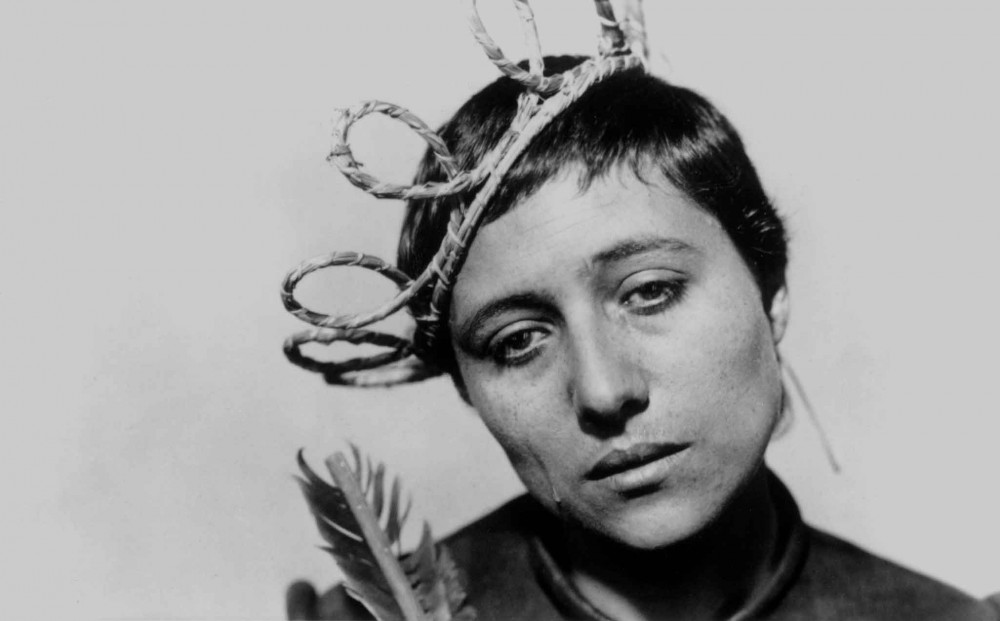THE PASSION OF JOAN OF ARC
12:30 2:50 5:10 7:30 9:50
Through Tuesday, December 5
NEW RESTORATION
Directed by Carl Theodor Dreyer
Starring Falconetti
Featuring Richard Einhorn’s Voices of Light
(1928) 1431, and the charismatic, mystic warrior Joan is led before her English and French inquisitors for the last day of her trial for heresy. Danish director Dreyer condensed months of interrogation into a single day, with all dialogue taken from the still-extant transcripts, built a gigantic re-creation of the city of Rouen, stylized in the manner of medieval illuminations, then hardly showed it at all as he concentrated on a non-stop set of brutally realistic, often low-angled close-ups of fevered intensity never before seen on screen (and seldom since), sans makeup or flattering lighting, focusing closest on what, per Pauline Kael (and many others), “may be the finest performance ever recorded on film” – Falconetti’s Joan. A stage star who helped popularize the Charleston in France, this was her second (and final) film role, with her every facial contour visible, and every slight movement of magnificently teary eyes denoting enigmatic spirituality and suffering. With Antonin Artaud (avant-garde playwright and actor of the Theatre of Cruelty) as the young, sympathetic monk and a final coda of burning, riot, running soldiers and villagers seen from both above and below that proved Dreyer a master of montage as well. This new restoration features composer Richard Einhorn’s acclaimed Voices of Light, a choral and orchestral work inspired by the film and performed by vocal ensemble Anonymous 4. DCP restoration. Approx. 88 min.
Restored by Gaumont with funding from the Centre National du Cinéma (CNC). The restoration was based on a preserved print created by La Cinémathèque Française for the 1985 reconstruction of the film, printed from a nitrate copy preserved and provided by the Danish Film Institute.
Presented with support from The George Fasel Memorial Fund for Classic French Cinema.
A JANUS FILMS RELEASE.
Reviews
“ONE OF THE HIGHEST MASTERPIECES OF THE CINEMA. Words indeed run aground when trying to assess the enormity and sophistication of this 1928 film. This is neither a hopeful nor a hopeless film, but one of feeling so colossal and resplendent, it can’t be constrained by prison or consumed by fire. If we can dare to extract one message from it, perhaps it should be: Believe women.”
– Jaime N. Christley, The Village Voice
“A CINEMATIC MUST-SEE! The miracle of Joan is that it manages to be spiritual and visceral… [Falconetti] embodies a spiritual anguish worthy of a medieval Pietà.”
– J. Hoberman, The New York Times. Read the full piece here.
“Every female lead performance owes a debt to Maria Falconetti, who poured her soul out in these classic close-ups.”
– Joshua Rothkopf, Time Out
“I wanted to interpret a hymn to the triumph of the soul over life… [Cinematographer] Rudolf Maté understood the demands of psychological drama in the close-ups and he gave me what I wanted, my feeling and my thought: realized mysticism. But in Falconetti, who plays Joan, I found what I might, with very bold expression, allow myself to call ‘the martyr’s reincarnation.’”
– Dreyer
“One of the greatest of all movies… No other film has so subtly linked eroticism with religious persecution.”
– Pauline Kael
“You cannot know the history of silent film unless you know the face of Renee Maria Falconetti. In a medium without words, where the filmmakers believed that the camera captured the essence of characters through their faces, to see Falconetti in The Passion of Joan of Arc is to look into eyes that will never leave you.”
– Roger Ebert
“Dreyer’s radical approach to constructing space and the slow intensity of his mobile style make this ‘difficult’ in the sense that, like all the greatest films, it reinvents the world from the ground up. It’s also painful in a way that all Dreyer’s tragedies are, but it will continue to live long after most commercial movies have vanished from memory.”
– Jonathan Rosenbaum, The Chicago Reader
“[Falconetti’s] extraordinarily expressive face made for one of the greatest, most harrowing screen performances.”
– Phillip French, The Guardian
“Seems like an historical document from an era in which the cinema didn’t exist.”
– Cocteau

